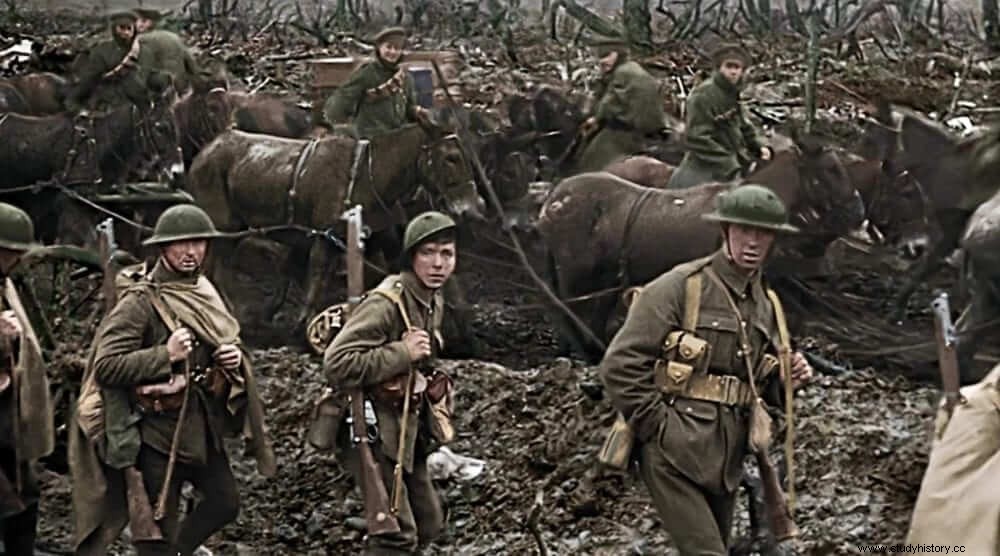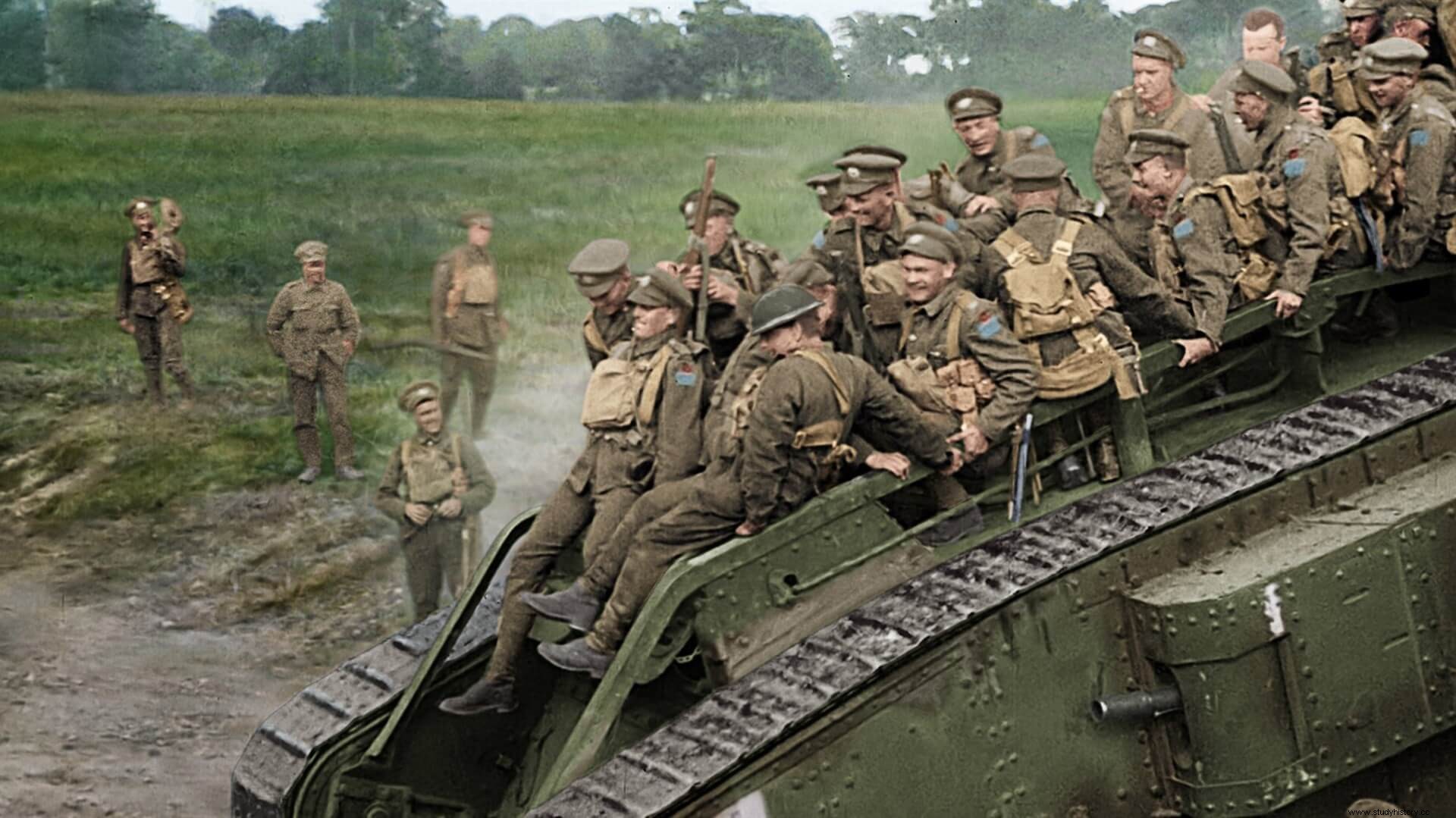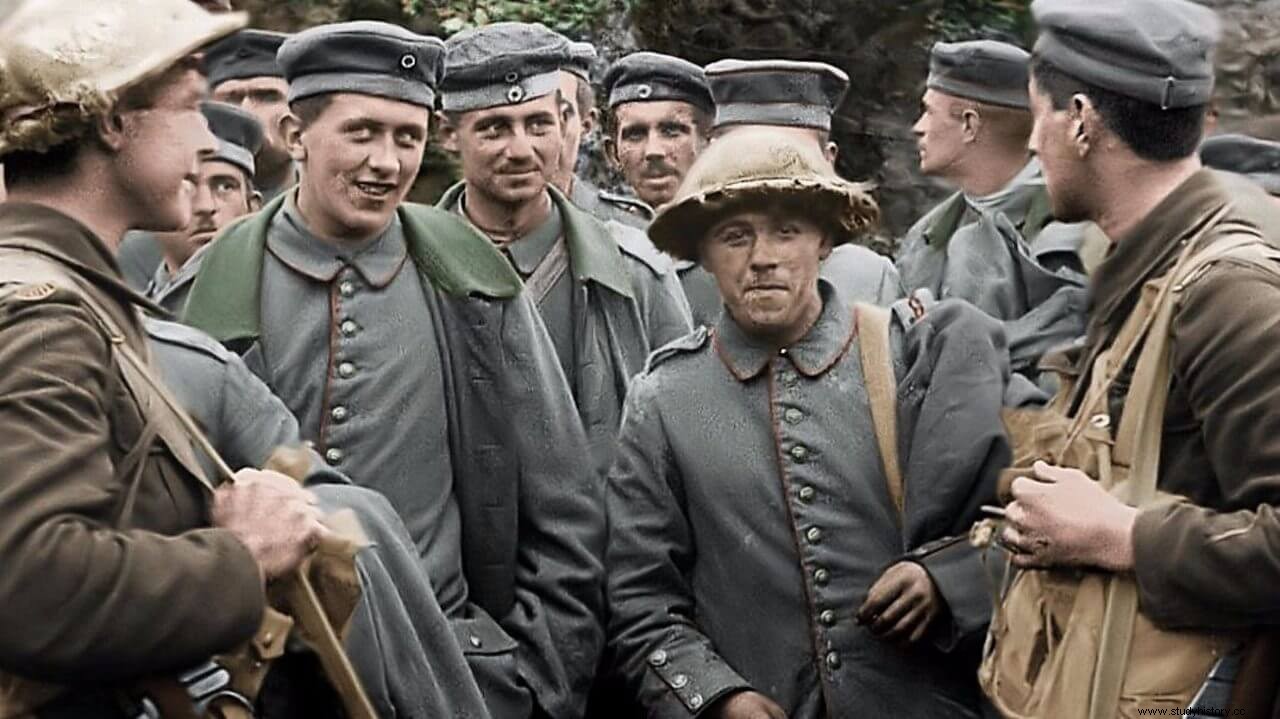
Canal Historia (which in Spain can be seen on Movistar+ ) premieres They will not grow old (They shall not grow old ) , a 2018 documentary promoted by 14-18 NOW[1], the Imperial War Museum and the BBC, distributed by Warner Bros and directed by celebrated New Zealand filmmaker Peter Jackson , world-renowned for his wonderful and multi-award winning film adaptation of J. R. R. Tolkien's work The Lord of the Rings (from the wreck he made with The Hobbit we better not talk). And in case someone still doesn't know, a true fan of the history of the First World War , in which his grandfather fought, Sergeant William Jackson (1890-1940) of the 2nd Battalion of the South Wales Borderers, to whom this film is dedicated.
Premiere at the BFI London Film Festival on October 16, 2018,They Shall Not Grow Old (95 minutes, 126 minutes in its extended version) has been a great commercial and critical success, nominated for best documentary at the BAFTAs.
The keys of They will not grow old
They will not age , whose original title is inspired by a line from the 1914 poem For the Fallen ("For the Fallen") by Laurence Bynion[2], has two major differences compared to any other historical documentary. In the first place, it lacks the classic voice-over narration, since it is based almost exclusively on direct testimonies of two hundred British and Commonwealth veterans collected by the BBC after the war, one hundred and twenty of them recorded on audio, a total of six hundred hours that the documentary team meticulously reviewed for editing. Let no one expect the German or French vision of the conflict, and I do not say this as criticism; It is simply not the objective of the documentary, and basically it does not matter.
These sincere, honest, personal voices, and bringing a devastatingly intimate perspective, take us back to the outbreak of the First World War in 1914 and tell us about their initial convictions, expectations and enthusiasm; of the enlistment fever and the admission to the ranks of volunteers well below the conscription age (19 years) with the acquiescence of the military authorities; of his first steps in military life:the demanding training, the uniforms (oh, the uncomfortable boots and cumbersome leggings!), the ranch...; and the arrival at the front, to a nebulous world structured by a labyrinth of trenches and surrounded by a lunar landscape of desolation and craters.

And second great novelty, it is at that moment of the arrival at the front when the documentary, articulated from more than one hundred hours of original footage and mostly unpublished photographs from the Imperial War Museum, he abandons black and white and the monotonous purr in the background of the cinematographic projector to enter a new dimension. The rest of the film is a true technical marvel for which it has been colored and sound effects have been added to the original footage:the voices of the soldiers, the orders of their officers, their conversations, their laughter…and their screams, the whistle of bullets and the constant backdrop of bomb explosions, which never stops.
The sum of personal testimonials, color and sound builds an authentic immersive experience for the viewer, which takes us into the microcosm of trench warfare. So much so that we do not know precisely when or where (the testimonials do not offer chronological or geographical data), what is relevant in They will not grow old it is not the historical events, but the particular worldview of the survivors. These tell us about their small (and few) daily joys, especially on days away from the front:tobacco, brothels, bets, games to kill time, etc.; and of its many miseries:the lack of hygiene, the infected collective toilets (a long bench or a simple trunk to sit on in front of a ditch), cohabitation with lice and rats, the stench of decomposing corpses, the rain that it floods the positions, the sea of mud, the freezing, the foot of the trench…
This is where the color prints a heartbreaking realism from which the ghostly nebula of black and white seemed to “protect” us in some way. Now we see with all its drama the dirt on their faces, the rotting of their teeth, the rotting of their gangrenous limbs... and the blood, especially the blood, which reminds us that we are witnessing a bloody war like no other. We witness the relentless bombardment of German batteries, the invisible threat of snipers, gas attacks whose yellowish poison we can almost smell, and we witness the emotional wear and tear of men.
But also of the powerful ties of camaraderie that are established in such extreme circumstances, and not only among the trench companions:beyond the propaganda, the Germans are spoken of with genuine respect, sympathy and even admiration, especially, it must be said, of the non-Prussians. In a certain way, they are also comrades, companions in that strange world that they have had to live in.

The relative friendliness of the footage thus far is truncated when the time for battle approaches (it doesn't matter which one, one, many, all):nervousness, anxiety, fear, noise, noise, noise and, for the first time, background music, raise the tension of the film to overwhelming limits in the climax of the combat.
Finally the noise stops, leaving a void perhaps even more oppressive than the bombardment itself. And then what to do after the armistice? there are no celebrations, the “feeling of having been fired from work” prevails, the end of the “only life” that many had known. How to rejoin a civil society indifferent to their suffering? For this they were outcasts, for themselves, "a race apart".

Rating
In short, They will not grow old It is an authentic work of art made not only from technical mastery, but also from a passion for history, to propose an approach to nonsense? barbarism? Let's leave it in reality of the war, the documentary does not judge, from the voices of its protagonists, that as I said at the beginning it does not matter that they are British, because their traumatic? transformer? experience is universal. Too bad that the subtitles in Spanish (The History Channel offers the documentary exclusively in the original version, a format that we would strongly recommend from here even if it were dubbed) are not up to par, with errors that sometimes border on the ridiculous.
Notes
[1] British Government program to promote artistic initiatives for the commemoration of the centenary of the First World War.
[2] «They shall grow not old, as we that are left grow old», «They will not grow old, as those of us who have remained grow old».
